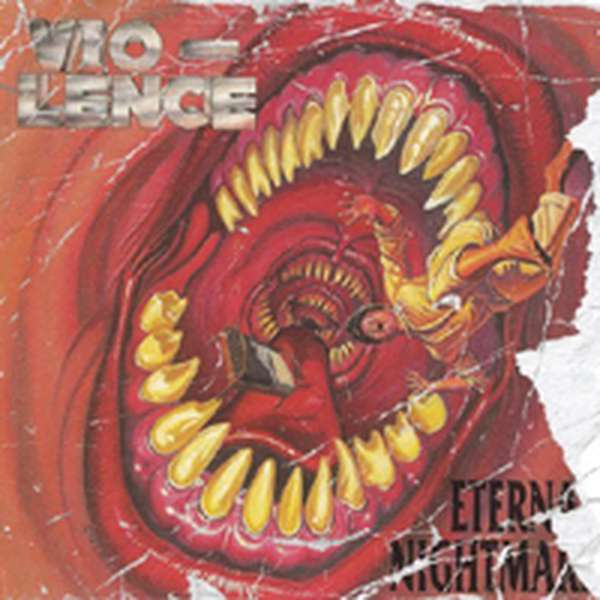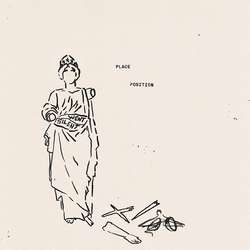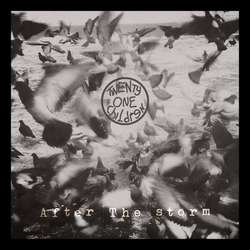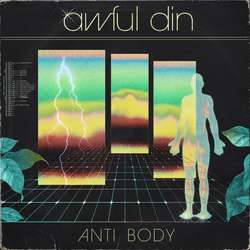Thrash: (verb) To move wildly or violently.
In 1986, in the genre known as "Thrash Metal", there were what was known as the "Big 4", referring to the most popular bands at the time - Slayer, Metallica, Anthrax and Megadeth. With the exception of Metallica, whose huge mainstream success in later years could not have even been conceived at the time, all of these bands were arguably enjoying the most successful time of their careers. Over the next couple of years, this success spawned a second wave of young upstarts from all over the globe - Kreator from Germany, Overkill from New York, and Dark Angel from Los Angeles. Of any localized scene, however - there was no place more rife with thrash than San Francisco's Bay Area, creating some of the best music of the time, were groups like Testament, Death Angel and the perhaps lesser-known but equally as relevant Vio-lence.
Formed in 1985, Vio-lence went through numerous growing pains and changes before solidifying their line-up with bassist Deen Dell, drummer Perry Strickland, vocalist Sean Killian and guitarists Rob Flynn and Phil Demmel. Even in a city with a strong, burgeoning scene, they quickly established themselves as having a reputation of being one of the strongest live acts around. So in 1988, there was already intense interest in the release of the group's debut album, Eternal Nightmare. While the initial release didn't make a huge splash as far as sales go, a firm and loyal fan base was quickly established.
It's now 2005 and 17 years later, the long-awaited Megaforce re-issue is here. In this instance, the term "long-awaited" is not a whimsical term - the initial and long out-of-print CD has consistently averaged over $100.00 on eBay. This release signifies something that's all too rare in the music industry. In an age where albums are constantly being tweaked, remastered, repackaged and regurgitated on the average sheep-like consumer, we have an album that actually warrants being re-released. Containing the original seven tracks, the reissue also boasts a second disc that includes 12 live tracks from a reunion show in 2001 so the rest of us poor, unfortunate bastards can find out what we missed, and if the songs are any indication, we missed a whole lot, my friends.
Eternal Nightmare begins coincidentally enough with the title track, segueing nicely into the gunshot intro of "Serial Killer". While the lyrics were apparently a collaborative process, with songs like "Kill on Command" and "Calling in the Coroner" these boys were seemingly of one mind. When read in silence, the lyrics can at times appear to be quite juvenile and ham fisted. It's not until they're spat like venom from the mouth of Killian that they really come to life.
I'd like to take a moment to talk about Sean Killian. Much has been made of his vocal abilities or lack thereof, depending on who you talk to. Granted, the manner in which he uses his voice is the very definition of "love it or hate it", but take it from someone well acquainted with heavy music, 87.4% of metal vocalists just aren't very good. Most of them are terrible, in fact. The way Killian uses his voice and delivers the lyrics is truly unlike anything I've ever heard. Don't think for a minute that this is a nice way of saying he sucks, folks - this is an introduction to my saying Sean Killian has one of the most unique styles, unique deliveries and just plain fucking coolest voices around. Add that to Demmel and Flynn's (although I've always shunned the use of the term in the past, it is absolutely applicable here) buzzsaw guitars, Dell's nard shaking bass and Strickland - on the short list of the best drummers ever to play this music we call "heavy" and what you have is one of the finest albums ever produced in the genre.
The seven tracks that make up Eternal Nightmare sound crisp and new, though nowhere on the packaging is there any mention of any remastering or tweaking taking place. The sound on the second disc is crisp and clear as well, though thankfully raw as it should be.
Now, if you're like me, you find live albums of heavy music about as useful as balls on a banjo - they can never capture the energy and aggression of the show, so why bother, right? Well, this set throws that whole cockamamie theory straight into the bin. "Reunion" show might not be an accurate term - as Demmel and Flynn (now in Machine Head) are replaced by Steve Schmidt and original, pre-Nightmare guitarist Troy Fua. The duo do a more than admirable job of churning out the tunes, in particular, "World in a World" (from the group's second album, Opressing the Masses) and the classic "Bodies on Bodies" (also included on the disc) making this a perfect addendum to a time capsule of a band who sadly is no longer with us, but can still remind us that even in a genre as frustratingly limited as metal, what great music can sound like.



